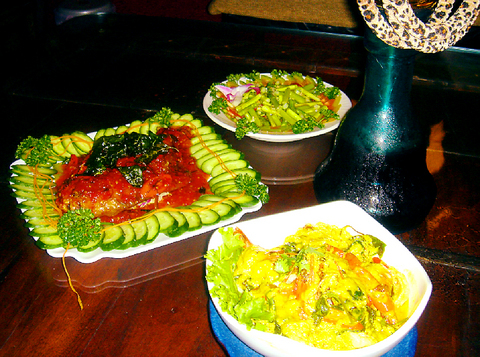Eating in bed is usually the preserve of the supine or the incapacitated, but a new establishment opened by five partners -- including Taiwan funny man Jacky Wu (吳宗憲) and Telly Liu (劉悟) -- aims to give the activity a more sophisticated slant. The bar/restaurant, open some three months, is not to be confused with a different establishment of the same name that is located behind the main shopping drag of Zhongxiao East Road.
Bed's decoration lies somewhere between opulent and exorbitant. Over three floors there are several seating arrangements decked out in a melange of Eastern styles and there is a lot of faux fur: VIP rooms with either sunken or raised seating, for which there is a minimum charge of NT$6,000 to NT$8,000, traditional dining tables and chairs and a small dining room that looks like an Indian safari camp.
On the first floor is a large sofa that is shaped like a plume of feathers and which wouldn't look out of place in an Ali Baba pantomime. Behind the stairs leading up to the second floor there is a selection of hookahs imported from Egypt. A range of aromatic tobacco is on offer ranging from the "special" at NT$1,500 to various fruit flavors, including strawberry at NT$500.

PHOTO: STEVE PRICE, TAIPEI TIMES
The mix-and-match decoration reflects the menu, which features dishes from Singapore, Thailand, Malaysia and Indonesia. This is a fusion restaurant so many of the recipes have been augmented. The shrimp green curry was served with a thicker sauce than the Thai staple -- and the heat had been turned down considerably. Other Thai options include green papaya salad and tom yum soup. The Thai-style raw shrimp comes highly recommended. "Like angels dancing on my tongue," commented one diner.
Fusion cuisine has come in for some bad press over the last few years for being over the top and too contrived, but The Bed doesn't tinker too much with the formula. Seafood features on the menu, with steamed lemon fish, crab vermicelli pot and spicy stir-fried squid. The three-flavor fish served with a sweet and sour chilli sauce is deep fried until the flesh becomes slightly chewy.
As it serves food until 2am The Bed is a good option for combining dining with imbibing and late night revelry. There is a DJ booth and the manager plans to change the layout on the first floor to make space for a small dance floor.

Most heroes are remembered for the battles they fought. Taiwan’s Black Bat Squadron is remembered for flying into Chinese airspace 838 times between 1953 and 1967, and for the 148 men whose sacrifice bought the intelligence that kept Taiwan secure. Two-thirds of the squadron died carrying out missions most people wouldn’t learn about for another 40 years. The squadron lost 15 aircraft and 148 crew members over those 14 years, making it the deadliest unit in Taiwan’s military history by casualty rate. They flew at night, often at low altitudes, straight into some of the most heavily defended airspace in Asia.

Beijing’s ironic, abusive tantrums aimed at Japan since Japanese Prime Minister Sanae Takaichi publicly stated that a Taiwan contingency would be an existential crisis for Japan, have revealed for all the world to see that the People’s Republic of China (PRC) lusts after Okinawa. We all owe Takaichi a debt of thanks for getting the PRC to make that public. The PRC and its netizens, taking their cue from the Chinese Communist Party (CCP), are presenting Okinawa by mirroring the claims about Taiwan. Official PRC propaganda organs began to wax lyrical about Okinawa’s “unsettled status” beginning last month. A Global

Taiwan’s democracy is at risk. Be very alarmed. This is not a drill. The current constitutional crisis progressed slowly, then suddenly. Political tensions, partisan hostility and emotions are all running high right when cool heads and calm negotiation are most needed. Oxford defines brinkmanship as: “The art or practice of pursuing a dangerous policy to the limits of safety before stopping, especially in politics.” It says the term comes from a quote from a 1956 Cold War interview with then-American Secretary of State John Foster Dulles, when he said: ‘The ability to get to the verge without getting into the war is

Like much in the world today, theater has experienced major disruptions over the six years since COVID-19. The pandemic, the war in Ukraine and social media have created a new normal of geopolitical and information uncertainty, and the performing arts are not immune to these effects. “Ten years ago people wanted to come to the theater to engage with important issues, but now the Internet allows them to engage with those issues powerfully and immediately,” said Faith Tan, programming director of the Esplanade in Singapore, speaking last week in Japan. “One reaction to unpredictability has been a renewed emphasis on